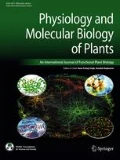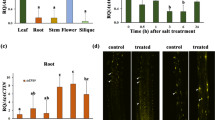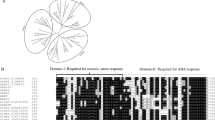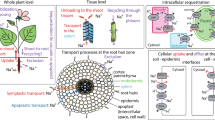Abstract
Seagrass meadows are one of the most important marine resources that grow along the coast. They provide habitat and a food source for animals. They also protect the coast, fix sediment and purify seawater. In the current period of global climate change, anomalies in coastal water temperatures are increasing. A sudden increase in water temperature owing to a heat wave can have a profound effect on seagrass. Zostera japonica is a type of intertidal seagrasses, which is exposed to the air at low tide. High temperatures in the summer often lead to a decline in seagrass meadows. DnaJ proteins, also known as J proteins, are a family of conserved chaperone proteins. They are designated as J proteins because they contain a highly conserved J domain. They function as chaperones of heat shock proteins in organisms. In this study, the role of DnaJ protein (ZjDjB1) of Z. japonica under heat stress was studied. ZjDjB1 was localized to the cytoplasm and nucleus. The overexpression of ZjDjB1 in Arabidopsis thaliana results in an increase in thermotolerance and a decrease in the accumulation of reactive oxygen species and also a reduction in membrane damage. ZjDjB1 may achieve this goal by maintaining a low activity of proteolytic enzymes.










Similar content being viewed by others
Data availability
All data generated or analyzed during this study are included in this published article. The nucleotide and deduced amino acid sequence data of ZjDjB1 were registered in the GenBank (No. MN395290).
References
Ahuja I, de Vos RC, Bones AM, Hall RD (2010) Plant molecular stress responses face climate change. Trends Plant Sci 15:664–674. https://doi.org/10.1016/j.tplants.2010.08.002
Benkert P, Biasini M, Schwede TJB (2011) Toward the estimation of the absolute quality of individual protein structure models. Bioinformatics 27:343–350
Bhalerao R, Keskitalo J, Sterky F, Erlandsson R, Bjorkbacka H, Birve SJ, Karlsson J, Gardestrom P, Gustafsson P, Lundeberg J, Jansson S (2003) Gene expression in autumn leaves. Plant Physiol 131(2):430–442
Brutnell TP, Sawers RJ, Mant A, Langdale JA (1999) BUNDLE SHEATH DEFECTIVE2, a novel protein required for post-translational regulation of the rbcL gene of maize. Plant Cell 11(5):849–864
Chen KM, HolmströM M, Raksajit W, Suorsa M, Piippo M (2010) Aro EMJBPB small chloroplast-targeted dnaj proteins are involved in optimization of photosynthetic reactions in arabidopsis thaliana. BMC Plant Biol 10(1):1–5
Chen S, Qiu G, Yang M (2019) SMRT sequencing of full-length transcriptome of seagrasses Zostera japonica. Sci Rep 9(1):1–3
Estelle M (2001) Proteases and cellular regulation in plants. Curr Opin Plant Biol 4:254–260. https://doi.org/10.1016/s1369-5266(00)00169-2
Finka A, Mattoo RU, Goloubinoff P (2011) Meta-analysis of heat- and chemically upregulated chaperone genes in plant and human cells. Cell Stress Chaperones 16:15–31. https://doi.org/10.1007/s12192-010-0216-8
Franssen SU et al (2011) Transcriptomic resilience to global warming in the seagrass Zostera marina, a marine foundation species. Proc Natl Acad Sci USA 108:19276–19281
Franssen SU et al (2014) Genome-wide transcriptomic responses of the seagrasses Zostera marina and Nanozostera noltii under a simulated heatwave confirm functional types Mar. Genomics 15:65–73. https://doi.org/10.1016/j.margen.2014.03.004
Hartl FU, Bracher A, Hayer-Hartl MJN (2011) Molecular chaperones in protein folding and proteostasis. Nature 475:324–332
Hennessy F, Nicoll WS, Zimmermann R, Cheetham ME, Blatch GL (2005) Not all J domains are created equal: Implications for the specificity of Hsp40–Hsp70 interactions. Protn Ence Sci 14(7):1697–1709
Hsieh MH, Chen JT, Jinn TL, Chen YM, Lin CY (1992) A class of soybean low molecular weight heat shock proteins : immunological study and quantitation. Plant Physiol 99:1279–1284. https://doi.org/10.1104/pp.99.4.1279
Jueterbock A et al (2016) Phylogeographic differentiation versus transcriptomic adaptation to warm temperatures in Zostera marina, a globally important seagrass. Mol Ecol. https://doi.org/10.1111/mec.13829
Keogh RC, Deverall BJ (1980) Mcleod SJTotBMS comparison of histological and physiological responses to phakopsora pachyrhizi resistant and susceptible soybean. Trans British Mycolo Soci 74:329–333
Kim M, Qin LZ, Kim SH, Song HJ, Lee KSJE, Coasts, (2019) Influence of water temperature anomalies on the growth of zostera marina plants held under high and low irradiance levels. Estuaries Coasts 43(3):463–473
Kong F, Deng Y, Wang G, Wang J, Liang X, Meng Q (2014) LeCDJ1, a chloroplast DnaJ protein, facilitates heat tolerance in transgenic tomatoes. J Integr Plant Biol 56(1):63–74
Konstantin A, Lorenza B, Jürgen K, Torsten SJB (2006) The SWISS-MODEL workspace: a web-based environment for protein structure homology modelling. Bioinformatics 22(2):195–201
Kumar D, Yusuf MA, Singh P, Sardar M, Sarin NB (2014) Histochemical detection of superoxide and h2o2 accumulation in brassica juncea seedlings. Bio-Protoc 4(8):e1108
Larkindale J, Vierling E (2008) Core genome responses involved in acclimation to high temperature. Plant Physiol 146:748–761. https://doi.org/10.1104/pp.107.112060
Li GL, Chang H, Li B, Zhou W, Sun DY, Zhou RG (2007) The roles of the atDjA2 and atDjA3 molecular chaperone proteins in improving thermotolerance of Arabidopsis thaliana seedlings. Plant Sci 173:408–416
Lobell DB, Schlenker W (1980) Costa-Roberts J (2011) Climate trends and global crop production since. Science 333:616–620. https://doi.org/10.1126/science.1204531
Low PS, Merida JR (1996) The oxidative burst in plant defense: Function and signal transduction. Physiol Plant 96:533–542
Massa SI et al (2011) Expressed sequence tags from heat-shocked seagrass Zostera noltii (Hornemann) from its southern distribution range. Mar Genomics. https://doi.org/10.1016/j.margen.2011.04.003
McClung CR, Davis SJ (2010) Ambient thermometers in plants: from physiological outputs towards mechanisms of thermal sensing. Curr Biol 20:1086–1092. https://doi.org/10.1016/j.cub.2010.10.035
Michael EC, Avrom JC (1998) Structure, function and evolution of DnaJ: conservation and adaptation of chaperone function. Cell Stress Chaperones 3:28–36
Miernyk JA (2001) The J-domain proteins of Arabidopsis thaliana: an unexpectedly large and diverse family of chaperones. Cell Stress Chaperones 6:209–218
Mittler R, Blumwald E (2010) Genetic engineering for modern agriculture: challenges and perspectives. Annu Rev Plant Biol 61:443–462. https://doi.org/10.1146/annurev-arplant-042809-112116
Parsell DA, Lindquist S (1993) The function of heat-shock proteins in stress tolerance: degradation and reactivation of damaged proteins. Annu Rev Genet 27:437–496. https://doi.org/10.1146/annurev.ge.27.120193.002253
Pulido P, Toledo-Ortiz G, Phillips MA, Wright LP, Rodriguez-Concepcion MJPC (2013) Arabidopsis J-Protein J20 delivers the first enzyme of the plastidial isoprenoid pathway to protein quality control. Plant Cell 25(10):4183–4194
Qin D et al (2008) Heat stress-responsive transcriptome analysis in heat susceptible and tolerant wheat (Triticum aestivum L.) by using Wheat Genome Array. BMC Genomics 9:432
Reusch TB et al (2008) Comparative analysis of expressed sequence tag (EST) libraries in the seagrass Zostera marina subjected to temperature stress. Mar Biotechnol. https://doi.org/10.1007/s10126-007-9065-6
Rizhsky L, Liang H, Shuman J, Shulaev V, Davletova S, Mittler R (2004) When defense pathways collide the response of arabidopsis to a combination of drought and heat stress. Plant Physiol. https://doi.org/10.1104/pp.103.033431
Ruelland E, Zachowski A (2010) How plants sense temperature. Environ Exp Bot 69:225–232
Ruocco M, Luca P, Marín-Guirao DL, Procaccini G (2019) Differential leaf age-dependent thermal plasticity in the keystone seagrass posidonia oceanica. Front Plant Sci. https://doi.org/10.3389/fpls.2019.01556
Sahi C, Craig EA (2007) Network of general and specialty J protein chaperones of the yeast cytosol. Proceed National Aca Sci USA 104(17):7163–7168
Suzuki N, Koussevitzky S, Mittler R, Miller G (2012) ROS and redox signalling in the response of plants to abiotic stress. Plant Cell Environ 35:259–270. https://doi.org/10.1111/j.1365-3040.2011.02336.x
Tamura K, Peterson D, Peterson N, Stecher G, Nei M, Kumar S (2011) MEGA5: molecular evolutionary genetics analysis using maximum likelihood, evolutionary distance, and maximum parsimony methods. Mole Bio Evol 28:2731–2739
Thomas R, Barends M et al (2013) Combining crystallography and EPR: crystal and solution structures of the multidomain cochaperone DnaJ. Acta Crystallogr 69:1540–1552
Timperio AM, Egidi MG, Zolla L (2008) Proteomics applied on plant abiotic stresses: role of heat shock proteins (HSP). J Proteomics 71(4):391–411
Traboni C, Mammola SD, Ruocco M, Ontoria Y, Ruiz JM, Procaccini G, Marín-Guirao L (2018) Investigating cellular stress response to heat stress in the seagrass Posidonia oceanica in a global change scenario. Mar Environ Res 141:12–23. https://doi.org/10.1016/j.marenvres.2018.07.007
Tubiello FN, Soussana JF, Howden SM (2007) Crop and pasture response to climate change. Proc Natl Acad Sci U S A 104:19686–19690. https://doi.org/10.1073/pnas.0701728104
Verma AK, Diwan D, Raut S, Dobriyal N, Sahi CJGG (2017) Evolutionary Conservation and Emerging Functional Diversity of the Cytosolic Hsp70: J Protein Chaperone Network of Arabidopsis thaliana G3. Genesgenetics 7:1941–1954
Walsh P, Bursa D, Law YC, Cyr D, Lithgow TJER (2004) The J-protein family: modulating protein assembly, disassembly and translocation. EMBO Rep 5:567–571
Wang W, Vinocur B, Shoseyov O (2004) Altman AJTiPe. Role of Plant Heat-Shock Proteins and Molecular Chaperones in the Abiotic Stress Response Trends in Plant Ence 9:244–252
Wang G, Kong F, Song Z, Xia M, Yong W, Meng Q (2015) A tomato chloroplast-targeted DnaJ protein protects Rubisco activity under heat stress. Plant Cell 66(11):3027–3040
Waters ER, Lee GJ, Vierling E (1996) Evolution, structure and function of the small heat shock proteins in plants. J Exp Bot 47:325–338
Wheeler TR, Craufurd PQ, Ellis RH, Porter JR, Prasad P (2015) Temperature variability and the yield of annual crops Agriculture. Ecosystems & Environment 82:159–167
Whelan S, Goldman N (2001) A general empirical model of protein evolution derived from multipleprotein families using a maximum-likelihood approach. Mol Biol Evol 18:691–699
Winters G, Nelle P, Fricke B, Rauch G, Reusch T (2011) Effects of a simulated heat wave on photophysiology and gene expression of high- and low-latitude populations of Zostera marina. Mar Ecology Progress 435(83):95
Yang KZ, Xia C, Liu XL, Dou XY, Journal DYJP (2010) A mutation in Thermosensitive Male Sterile 1, encoding a heat shock protein with DnaJ and PDI domains, leads to thermosensitive gametophytic male sterility in Arabidopsis. Plant J 57:870–882
Yuan JS, Reed A, Chen F, Stewart CN Jr (2006) Statistical analysis of real-time PCR data. BMC Bioinformatics 7:85. https://doi.org/10.1186/1471-2105-7-85
Zhou W et al (2012) The Arabidopsis J-protein AtDjB1 facilitates thermotolerance by protecting cells against heat-induced oxidative damage. New Phytol 194:364–378
Funding
This study was funded by the Natural Science Foundation of Guangxi Province (2020GXNSFAA297067; 2018GXNSFBA281062), the Research Fund Program of Guangxi Key Lab of Mangrove Conservation and Utilization (Grant No. GKLMC-20A04, GKLMC-20A01); the Distinguished Employment Offered Unit of Guangxi for Conservation and Ecological Monitoring of Mangroves and Seagrasses, the National Science & Technology Basic Work Program (2015FY110600) and the National Key Research and Development Program of China (2017YFC0506100). These funding bodies had no role in the design of the study, collection, analysis, and interpretation of data, or in the writing of the manuscript.
Author information
Authors and Affiliations
Contributions
SC designed the experiment and carry out the experiment. GQ conducted field sampling and identification. SC and GQ wrote the manuscript. All the authors reviewed the manuscript.
Corresponding authors
Ethics declarations
Conflict of interest
The authors declare that they have no conflict of interest.
Additional information
Publisher's Note
Springer Nature remains neutral with regard to jurisdictional claims in published maps and institutional affiliations.
Rights and permissions
About this article
Cite this article
Chen, S., Qiu, G. Overexpression of seagrass DnaJ gene ZjDjB1 enhances the thermotolerance of transgenic arabidopsis thaliana. Physiol Mol Biol Plants 27, 2043–2055 (2021). https://doi.org/10.1007/s12298-021-01063-6
Received:
Revised:
Accepted:
Published:
Issue Date:
DOI: https://doi.org/10.1007/s12298-021-01063-6




